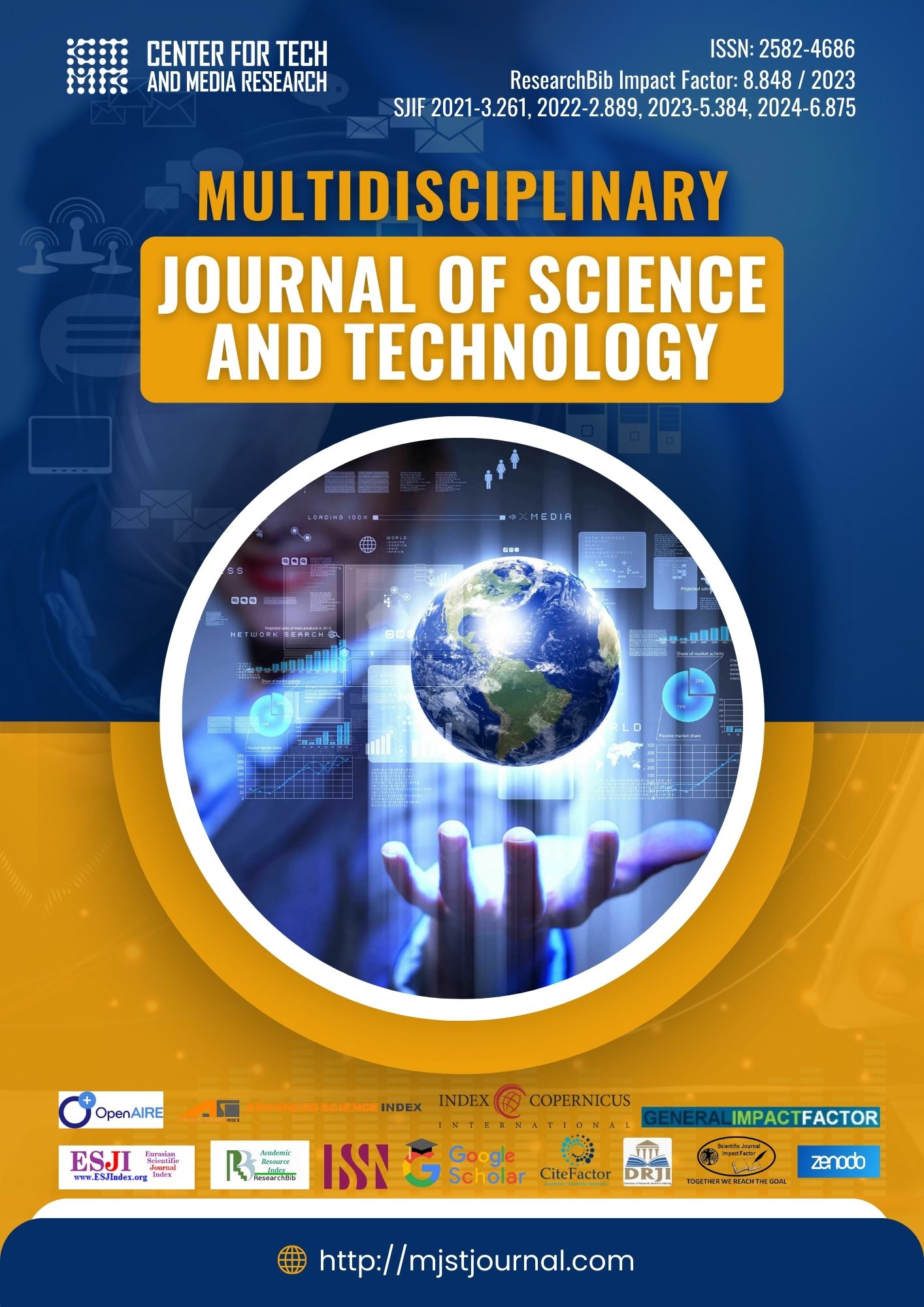Comparative Analysis of methods for Predicting the Trajectory of Object Movement in a Collaborative Robot-Manipulator Working Area
Svitlana Maksymova
Department of Computer-Integrated Technologies, Automation and Robotics, Kharkiv National University of Radio Electronics, Ukraine
Amer Abu-Jassar
Department of Computer Science, College of Computer Sciences and Informatics, Amman Arab University, Amman, Jordan
Dmytro Gurin
Department of Computer-Integrated Technologies, Automation and Robotics, Kharkiv National University of Radio Electronics, Ukraine
Vladyslav Yevsieiev
Department of Computer-Integrated Technologies, Automation and Robotics, Kharkiv National University of Radio Electronics, Ukraine
##semicolon## Industry 5.0##common.commaListSeparator## Collaborative Robot##common.commaListSeparator## Work Area##common.commaListSeparator## Computer Vision##common.commaListSeparator## Trajectory Prediction
सार
This article presents a comparative analysis of methods for predicting object movement trajectories in a collaborative robots-manipulator working area. The following approaches are evaluated: linear method, Kalman filter, extended Kalman filter (EKF), behavioral models and LSTM models. A mathematical description of each method is accompanied by an analysis of their advantages and disadvantages, including prediction accuracy, implementation complexity, and resource requirements. The results show that the choice of the method depends on the specifics of the task and the robot's operating conditions, which allows for an optimal combination of efficiency and computational costs.##submission.citations##
1. Gurin, D., & et al. (2024). Using Convolutional Neural Networks to Analyze and Detect Key Points of Objects in Image. Multidisciplinary Journal of Science and Technology, 4(9), 5-15.
2. Yevsieiev, V., & et al. (2024). The Canny Algorithm Implementation for Obtaining the Object Contour in a Mobile Robot’s Workspace in Real Time. Journal of Universal Science Research, 2(3), 7–19.
3. Bortnikova, V., & et al. (2019). Structural parameters influence on a soft robotic manipulator finger bend angle simulation. In 2019 IEEE 15th International Conference on the Experience of Designing and Application of CAD Systems (CADSM), IEEE, 35-38.
4. Gurin, D., & et al. (2024). Using the Kalman Filter to Represent Probabilistic Models for Determining the Location of a Person in Collaborative Robot Working Area. Multidisciplinary Journal of Science and Technology, 4(8), 66-75.
5. Samoilenko, H., & et al. (2024). Review for Collective Problem-Solving by a Group of Robots. Journal of Universal Science Research, 2(6), 7-16.
6. Attar, H., Abu-Jassar, A. T., Yevsieiev, V., Lyashenko, V., Nevliudov, I., & Luhach, A. K. (2022). Zoomorphic Mobile Robot Development for Vertical Movement Based on the Geometrical Family Caterpillar. Computational intelligence and neuroscience, 2022, 3046116.
7. Baker, J. H., Laariedh, F., Ahmad, M. A., Lyashenko, V., Sotnik, S., & Mustafa, S. K. (2021). Some interesting features of semantic model in Robotic Science. SSRG International Journal of Engineering Trends and Technology, 69(7), 38-44.
8. Nevliudov, I., Yevsieiev, V., Lyashenko, V., & Ahmad, M. A. (2021). GUI Elements and Windows Form Formalization Parameters and Events Method to Automate the Process of Additive Cyber-Design CPPS Development. Advances in Dynamical Systems and Applications, 16(2), 441-455.
9. Lyashenko, V., Abu-Jassar, A. T., Yevsieiev, V., & Maksymova, S. (2023). Automated Monitoring and Visualization System in Production. International Research Journal of Multidisciplinary Technovation, 5(6), 9-18.
10. Abu-Jassar, A. T., Attar, H., Lyashenko, V., Amer, A., Sotnik, S., & Solyman, A. (2023). Access control to robotic systems based on biometric: the generalized model and its practical implementation. International Journal of Intelligent Engineering and Systems, 16(5), 313-328.
11. Al-Sharo, Y. M., Abu-Jassar, A. T., Sotnik, S., & Lyashenko, V. (2023). Generalized Procedure for Determining the Collision-Free Trajectory for a Robotic Arm. Tikrit Journal of Engineering Sciences, 30(2), 142-151.
12. Ahmad, M. A., Sinelnikova, T., Lyashenko, V., & Mustafa, S. K. (2020). Features of the construction and control of the navigation system of a mobile robot. International Journal of Emerging Trends in Engineering Research, 8(4), 1445-1449.
13. Yevsieiev, V., & et al. (2024). Object Recognition and Tracking Method in the Mobile Robot’s Workspace in Real Time. Technical science research in Uzbekistan, 2(2), 115- 124.
14. Bortnikova, V., & et al. (2019). Mathematical model of equivalent stress value dependence from displacement of RF MEMS membrane. In 2019 IEEE XVth International Conference on the Perspective Technologies and Methods in MEMS Design (MEMSTECH), IEEE, 83-86.
15. Funkendorf, A., & et al. (2019). 79 Mathematical Model of Adapted Ultrasonic Bonding Process for MEMS Packaging. In 2019 IEEE XVth International Conference on the Perspective Technologies and Methods in MEMS Design (MEMSTECH), IEEE, 79-82.
16. Gurin, D., & et al. (2024). Effect of Frame Processing Frequency on Object Identification Using MobileNetV2 Neural Network for a Mobile Robot. Multidisciplinary Journal of Science and Technology, 4(8), 36-44.
17. Abu-Jassar, A., & et al. (2023). Obstacle Avoidance Sensors: A Brief Overview. Multidisciplinary Journal of Science and Technology, 3(5), 4-10.
18. Yevsieiev, V., & et al. (2024). Building a traffic route taking into account obstacles based on the A-star algorithm using the python language. Technical Science Research In Uzbekistan, 2(3), 103-112.
19. Gurin, D., & et al. (2024). MobileNetv2 Neural Network Model for Human Recognition and Identification in the Working Area of a Collaborative Robot. Multidisciplinary Journal of Science and Technology, 4(8), 5-12.
20. Sotnik S., & et al.. (2022). Key Directions for Development of Modern Expert Systems. International Journal of Engineering and Information Systems (IJEAIS), 6(5), 4-10.
21. Sotnik S., & Lyashenko V. (2022). Prospects for Introduction of Robotics in Service. International Journal of Academic Engineering Research (IJAER), 6(5), 4-9.
22. Lyashenko, V., & Sotnik, S. (2022). Overview of Innovative Walking Robots. International Journal of Academic Engineering Research (IJAER), 6(4), 3-7.
23. Lyashenko, V., & et al.. (2021). Semantic Model Workspace Industrial Robot. International Journal of Academic Engineering Research, 5(9), 40-48.
24. Matarneh, R., & et al.. (2019). Development of an Information Model for Industrial Robots Actuators. IOSR Journal of Mechanical and Civil Engineering (IOSR-JMCE), 16(1), 61- 67.
25. Lyashenko, V., Ahmad, M. A., Belova, N., & Sotnik, S. (2021). Modern Walking Robots: A Brief Overview. International Journal of Recent Technology and Applied Science (IJORTAS), 3(2), 32-39.
26. Sotnik, S., & et al.. (2022). Analysis of Existing Infliences in Formation of Mobile Robots Trajectory. International Journal of Academic Information Systems Research, 6(1), 13-20.
27. Sotnik, S., & et al.. (2022). Modern Industrial Robotics Industry. International Journal of Academic Engineering Research, 6(1), 37-46.
28. Baranova, V., Zeleniy, O., Deineko, Z., & Lyashenko, V. (2019, October). Stochastic Frontier Analysis and Wavelet Ideology in the Study of Emergence of Threats in the Financial Markets. In 2019 IEEE International Scientific-Practical Conference Problems of Infocommunications, Science and Technology (PIC S&T) (pp. 341-344). IEEE.
29. Слюніна, Т. Л., Бережний, Є. Б., & Ляшенко, В. В. (2007). Розвиток вітчизняної мережі банківських установ: особливості та регіональні аспекти. Вісник ХНУ ім. В. Н. Каразіна. Економічна серія, 755. 84–88.
30. Ляшенко В. В. (2007). Интерпретация и анализ статистических данных, описывающих процессы экономической динамики. Бизнес Информ, 9(2), 108-113.
31. Lyashenko, V. V., Matarneh, R., Kobylin, O., & Putyatin, Y. P. (2016). Contour Detection and Allocation for Cytological Images Using Wavelet Analysis Methodology. International Journal, 4(1), 85-94.
32. Al-Sharo, Y. M., Abu-Jassar, A. T., Sotnik, S., & Lyashenko, V. (2021). Neural networks as a tool for pattern recognition of fasteners. International Journal of Engineering Trends and Technology, 69(10), 151-160.
33. Abu-Jassar, A. T., Al-Sharo, Y. M., Lyashenko, V., & Sotnik, S. (2021). Some Features of Classifiers Implementation for Object Recognition in Specialized Computer systems. TEM Journal, 10(4), 1645.
34. Matarneh, R., Maksymova, S., Deineko, Z., & Lyashenko, V. (2017). Building robot voice control training methodology using artificial neural net. International Journal of Civil Engineering and Technology, 8(10), 523-532.
35. Sotnik, S., Matarneh, R., & Lyashenko, V. (2017). System model tooling for injection molding. International Journal of Mechanical Engineering and Technology, 8(9), 378- 390.
36. Al-Sherrawi, M. H., Lyashenko, V., Edaan, E. M., & Sotnik, S. (2018). Corrosion as a source of destruction in construction. International Journal of Civil Engineering and Technology, 9(5), 306-314.
37. Lyashenko, V., Ahmad, M. A., Sotnik, S., Deineko, Z., & Khan, A. (2018). Defects of communication pipes from plastic in modern civil engineering. International Journal of Mechanical and Production Engineering Research and Development, 8(1), 253-262.
38. Lyashenko, V. V., Matarneh, R., Baranova, V., & Deineko, Z. V. (2016). Hurst Exponent as a Part of Wavelet Decomposition Coefficients to Measure Long-term Memory Time Series Based on Multiresolution Analysis. American Journal of Systems and Software, 4(2), 51- 56.
39. Abu-Jassar, A. T., Attar, H., Amer, A., Lyashenko, V., Yevsieiev, V., & Solyman, A. (2024). Remote Monitoring System of Patient Status in Social IoT Environments Using Amazon Web Services (AWS) Technologies and Smart Health Care. International Journal of Crowd Science.
40. Babker, A. M., Suliman, R. S., Elshaikh, R. H., Boboyorov, S., & Lyashenko, V. (2024). Sequence of Simple Digital Technologies for Detection of Platelets in Medical Images. Biomedical and Pharmacology Journal, 17(1), 141-152.
41. Orobinskyi, P., Deineko, Z., & Lyashenko, V. (2020). Comparative Characteristics of Filtration Methods in the Processing of Medical Images. American Journal of Engineering Research, 9(4), 20-25.
42. Tahseen A. J. A., & et al.. (2023). Binarization Methods in Multimedia Systems when Recognizing License Plates of Cars. International Journal of Academic Engineering Research (IJAER), 7(2), 1-9.
43. Lyubchenko, V., Veretelnyk, K., Kots, P., & Lyashenko, V. (2024). Digital image segmentation procedure as an example of an NP-problem. Multidisciplinary Journal of Science and Technology, 4(4), 170-177.
44. Drugarin, C. V. A., Lyashenko, V. V., Mbunwe, M. J., & Ahmad, M. A. (2018). Pre-processing of Images as a Source of Additional Information for Image of the Natural Polymer Composites. Analele Universitatii'Eftimie Murgu', 25(2).
45. Marchetti, F., & et al. (2020). Multiple trajectory prediction of moving agents with memory augmented networks. IEEE Transactions on Pattern Analysis and Machine Intelligence, 45(6), 6688-6702.
46. Fang, L., & et al. (2020). Tpnet: Trajectory proposal network for motion prediction. In Proceedings of the IEEE/CVF Conference on Computer Vision and Pattern Recognition, pp. 6797-6806.
47. Dendorfer, P., & et al. (2020). Goal-gan: Multimodal trajectory prediction based on goal position estimation. In Proceedings of the Asian Conference on Computer Vision.
48. Quan, R., & et al. (2021). Holistic LSTM for pedestrian trajectory prediction. IEEE transactions on image processing, 30, 3229-3239.
49. Xiao, C., & et al. (2024). Motiontrack: Learning motion predictor for multiple object tracking. Neural Networks, 179, 106539.
50. Zhang, Z., & et al. (2020). Stinet: Spatio-temporal-interactive network for pedestrian detection and trajectory prediction. In Proceedings of the IEEE/CVF Conference on Computer Vision and Pattern Recognition, 11346-11355).

















